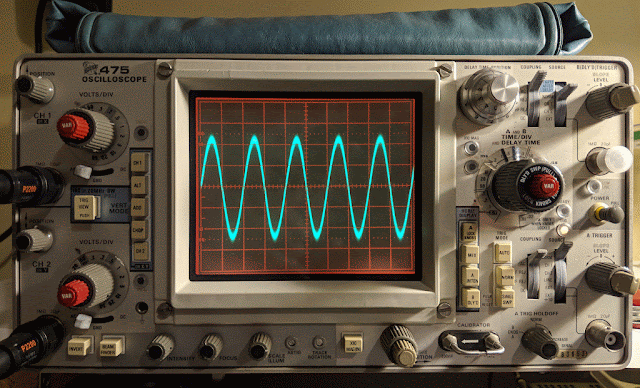 Oscilloscope now on the bench
Oscilloscope now on the bench
Tektronix 475 Oscilloscope and Android Signal Generator App
When I was debugging problems with my Ten-Tec Century/21, and especially my problematic one-watter kit, I needed to see more than DC voltages. I carried my problem stuff to my friend Paul to see what his scope and signal generator revealed.
Why would a ham need a scope? Audio and RF are both AC (alternating current) and a voltmeter alone doesn't offer much insight into that world of voltage across time and phase.
I almost bought an inexpensive digital scope last year, then thought better of it. Then I almost bought a featured digital scope and checked my wallet and thought better of it. A good digital scope in the 100 Mhz and up range from reliable sources costs upwards of $500. On the other hand, older professional scopes that have been well maintained and kept in calibration are excellent choices and will last a lifetime. You do give up handy on screen cursors for measurements, so you have to count divisions by hand and do the math. You also don't have digital storage in a digital scope, but smart phone cameras and video can make up for that.
When I saw this recently calibrated Tektronix 475 listed in the classifieds on eHam.net for a nice price, I decided it was time to step into the world of visualized AC.
 |
| Watching a capacitor charge 250 times a second The lines are a bit wide because the signal source was noisy |
Tek 475 Specs
The Tektronix 475 is a portable (30 lbs), dual-trace oscilloscope with dual time-bases similar to the 465, but with 200 MHz bandwidth and a maximum vertical sensitivity of 2 mV/Div. It is all solid-state except for the CRT. It was introduced in November 1972.
This scope cost $3,000 when it was new. Now you can find them in good condition for less than $200.
- Bandwidth -- 200 MHz (475), AC cutoff 10 Hz, switchable BW limit 20 MHz
- Rise time -- 1.75 ns (475)
- Deflection -- 2 mV/Div to 5 V/Div, 1-2-5
- Cascaded mode -- 400 μV/Div, 50 MHz with CH1 input connected to CH2 VERT SIG OUT
- Time base -- 10 ns/Div to 500 ms/Div, 1-2-5, and ×10 magnifier
- Input impedance -- 1 MΩ // 20 pF
- Triggering -- 0.3 Div (int) or 50 mV (ext) to 40 MHz, increasing to 1.5 Div/250 mV at 200 MHz; AC coupling >60 Hz; LF REJ >50 kHz, HF REJ <50 khz="" li="">
- X bandwidth -- 3 MHz
- Z axis input -- 5 Vp-p, 50 MHz
- Calibrator -- 1 kHz, 30 mA / 300 mV square wave
- Outputs -- CH2 Vert Signal Out, 20 mV/Div into 1 MΩ or 10 mV/Div into 50 Ω; A and B +GATE OUT, +5 V; Probe power jack
- CRT -- 8 × 10 cm², P31 phosphor (P11 opt.)
- Power -- 110, 115, 120, 220, 230 or 240 VAC ±10%, 48-440 Hz, max. 100 W
Real knobs and switches
One advantage of an analog scope is that there is a labeled switch or knob for every function. No need to dig through menus to figure out how to do something. To me this is the a true advantage to finding a well calibrated, analog scope.
An oscilloscope needs a function generator
An scope let's you visualize AC within a circuit, but when you testing something you often need to inject AC into that circuit. That's the role played by a function generator. Function generators allow you to choose a frequency and a wave type (sine, triangle, square, etc.), or sweep across frequencies.
In general, the higher the frequency they support the more they cost.
If you have a mobile device you can get one that uses your headphone jack as output up to 22 kHz for free...
For a free app it is very nice. It outputs sine waves very well, triangle waves are a bit soft pointed and square waves are for entertainment purposes only. But it is free so I won't complain. In the image below you can see the oscillations as it tries to generate a square wave but the audio amplifier of the mobile device just doesn't have that kind of control.
Square Wave?
The square wave is bad but sine and triangle waves look good until the frequency get's near the top of the range or the amplitude is raised too high.  |
| Sine Waves look good |
 |
| Triangle waves are on as well until you go up in frequency |
The free app is inadequate for bench testing
While I appreciate that this would be a useful, portable signal generator for testing audio circuits, I'll be ordering a purpose-built function generator because generating clean square waves is an important test signal to be clean. I also will need a generator that works above audio frequencies, hopefully up the the IF frequencies of the some of the equipment I'm testing.
Only the beginning
Having an oscilloscope is a new adventure for me. I have another 1-watter kit ready to build that I've been holding off on because I wanted a scope for troubleshooting. In the meantime I'm using the scope to watch transistors trigger and measure the timing circuits I'm building and learning how to control the scope. The Tektronix 475 is a feature-rich analog scope. If you plan to fix your own equipment or do some homebrew electronics work a scope can come in handy.
That's all for now
Sow lower your power and sample it with a scope
72/73
Richard AA4OO


















